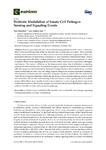Probiotic Modulation of Innate Cell Pathogen Sensing and Signaling Events
| dc.contributor.author | Llewellyn, A | |
| dc.contributor.author | Foey, Andrew | |
| dc.date.accessioned | 2018-10-24T08:58:06Z | |
| dc.date.available | 2018-10-24T08:58:06Z | |
| dc.date.issued | 2017-10 | |
| dc.identifier.issn | 2072-6643 | |
| dc.identifier.issn | 2072-6643 | |
| dc.identifier.other | ARTN 1156 | |
| dc.identifier.uri | http://hdl.handle.net/10026.1/12602 | |
| dc.description.abstract |
There is a growing body of evidence documenting probiotic bacteria to have a beneficial effect to the host through their ability to modulate the mucosal immune system. Many probiotic bacteria can be considered to act as either immune activators or immune suppressors, which have appreciable influence on homeostasis, inflammatory- and suppressive-immunopathology. What is becoming apparent is the ability of these probiotics to modulate innate immune responses via direct or indirect effects on the signaling pathways that drive these activatory or suppressive/tolerogenic mechanisms. This review will focus on the immunomodulatory role of probiotics on signaling pathways in innate immune cells: from positive to negative regulation associated with innate immune cells driving gut mucosal functionality. Research investigations have shown probiotics to modulate innate functionality in many ways including, receptor antagonism, receptor expression, binding to and expression of adaptor proteins, expression of negative regulatory signal molecules, induction of micro-RNAs, endotoxin tolerisation and finally, the secretion of immunomodulatory proteins, lipids and metabolites. The detailed understanding of the immunomodulatory signaling effects of probiotic strains will facilitate strain-specific selective manipulation of innate cell signal mechanisms in the modulation of mucosal adjuvanticity, immune deviation and tolerisation in both healthy subjects and patients with inflammatory and suppressive pathology. | |
| dc.format.extent | 1156-1156 | |
| dc.format.medium | Electronic | |
| dc.language | en | |
| dc.language.iso | eng | |
| dc.publisher | MDPI AG | |
| dc.subject | probiotics | |
| dc.subject | innate | |
| dc.subject | epithelial cells | |
| dc.subject | dendritic cells | |
| dc.subject | neutrophils | |
| dc.subject | macrophages | |
| dc.subject | signaling | |
| dc.subject | immunomodulation | |
| dc.subject | cytokines | |
| dc.subject | inflammation | |
| dc.title | Probiotic Modulation of Innate Cell Pathogen Sensing and Signaling Events | |
| dc.type | journal-article | |
| dc.type | Journal Article | |
| dc.type | Review | |
| plymouth.author-url | https://www.webofscience.com/api/gateway?GWVersion=2&SrcApp=PARTNER_APP&SrcAuth=LinksAMR&KeyUT=WOS:000414629900112&DestLinkType=FullRecord&DestApp=ALL_WOS&UsrCustomerID=11bb513d99f797142bcfeffcc58ea008 | |
| plymouth.issue | 10 | |
| plymouth.volume | 9 | |
| plymouth.publication-status | Published online | |
| plymouth.journal | Nutrients | |
| dc.identifier.doi | 10.3390/nu9101156 | |
| plymouth.organisational-group | /Plymouth | |
| plymouth.organisational-group | /Plymouth/Faculty of Health | |
| plymouth.organisational-group | /Plymouth/Faculty of Health/School of Biomedical Sciences | |
| plymouth.organisational-group | /Plymouth/REF 2021 Researchers by UoA | |
| plymouth.organisational-group | /Plymouth/REF 2021 Researchers by UoA/UoA01 Clinical Medicine | |
| plymouth.organisational-group | /Plymouth/REF 2021 Researchers by UoA/UoA01 Clinical Medicine/UoA01 Clinical Medicine | |
| plymouth.organisational-group | /Plymouth/Research Groups | |
| plymouth.organisational-group | /Plymouth/Research Groups/Institute of Translational and Stratified Medicine (ITSMED) | |
| plymouth.organisational-group | /Plymouth/Research Groups/Institute of Translational and Stratified Medicine (ITSMED)/CBR | |
| plymouth.organisational-group | /Plymouth/Users by role | |
| plymouth.organisational-group | /Plymouth/Users by role/Academics | |
| dc.publisher.place | Switzerland | |
| dcterms.dateAccepted | 2017-10-09 | |
| dc.identifier.eissn | 2072-6643 | |
| dc.rights.embargoperiod | Not known | |
| rioxxterms.versionofrecord | 10.3390/nu9101156 | |
| rioxxterms.licenseref.uri | http://www.rioxx.net/licenses/all-rights-reserved | |
| rioxxterms.licenseref.startdate | 2017-10-23 | |
| rioxxterms.type | Journal Article/Review |


